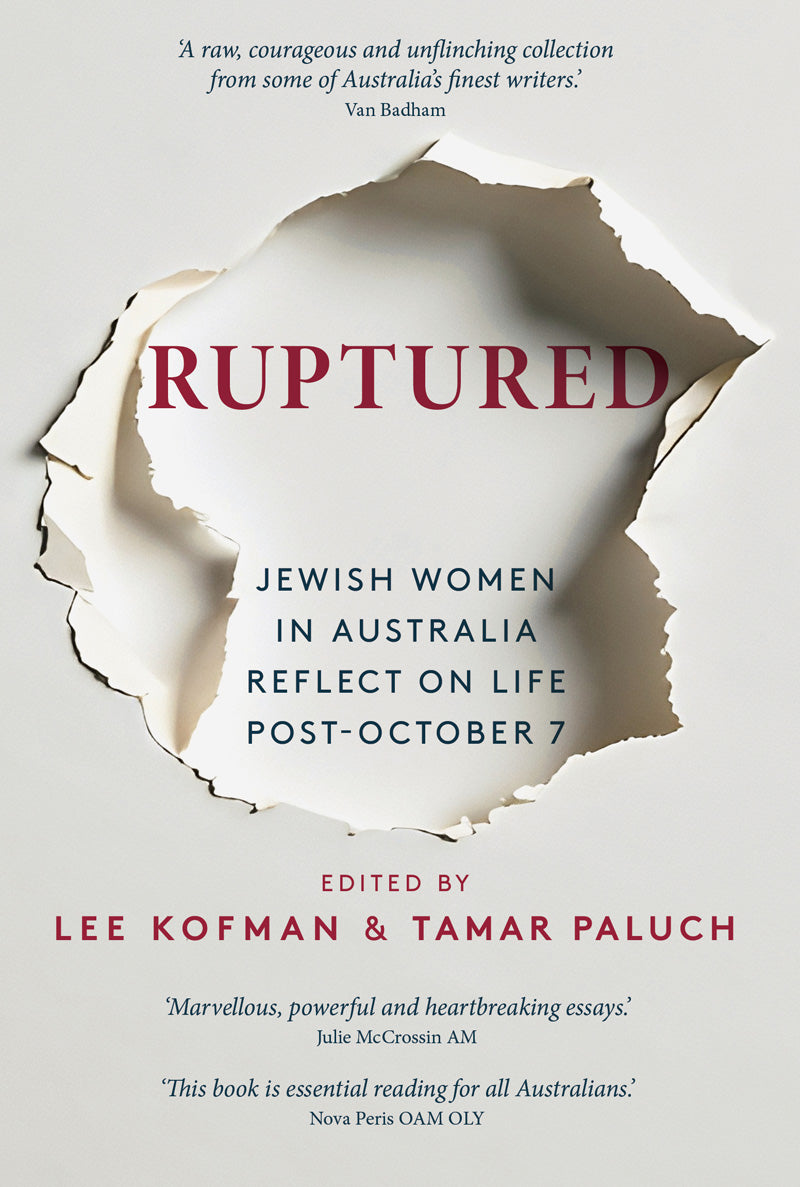Lee Kofman, Tamar Paluch
Ruptured - Jewish Women in Australia Reflect on Life Post-October 7
Ruptured - Jewish Women in Australia Reflect on Life Post-October 7
Couldn't load pickup availability
In this powerful collection of personal essays, thirty-six Australian Jewish women, including Ramona Koval, Dani Valent and Kylie Moore-Gilbert, reveal how their lives were turned upside down in the wake of October 7 attacks.
SAM'S REVIEW
On October 7th 2023, as news of the atrocities committed by Hamas spread, I stood almost in disbelief. This couldn't be happening. It just couldn't. But it was. Murders, rapes, mutilations and kidnappings; indiscriminate of sex and age; even babies targeted. It was a horror movie made life. I was shaken despite having no connection to Israel, no friends of family living there. I can only imagine the terror of those caught in the massacre, and of those who had to wait to hear whether their friends and family had been.
Ruptured, a collection of essays edited by Lee Kofman and Tamar Paluch, gives voice to the experience of Australian Jewish women since that terrible day. We hear from a wide variety of voices: from those who have lived in Israel and those who have never visited; from a rabbi and from religious agnostics; from artists, lawyers and Olympians; from women whose lineage is entirely Jewish and women whose ethnicity is mixed. Their faith, politics and cultural practices vary but, tragically, their experiences do not - all have seen the horrors of October 7th quickly forgotten and antisemitism rapidly increase.
Siana Einfield writes of finding the streets of Thornbury in Melbourne "covered with posters, stickers and graffiti claiming that Israel is a baby-killing regime and an apartheid state, that Zionism is terrorism, and more"; of being forced to leave the community she had loved and move to the other side of Melbourne because of the ongoing antisemitic attacks and the lack of support from those she had considered friends. Jesse Bowker talks of her son's experience in school: of having his fellow students yell at him "Hitler was great!" and "F*!k the Jews!". Less dramatically but just as painfully, many of the authors write of non-Jewish friends ghosting them, unwilling to confront or even discuss the anguish the women were experiencing.
Even the supposedly tolerant, diverse, critical-thinking, creative arts scene has become unwelcoming, even hostile, to Jewish writers and artists; their support for Palestine and fury with Netanyahu sliding towards and on occasion into antisemitism. As Lee Kofman writes, her pain visceral: "More than a few writers - authors of nuanced, thoughtful books, people known for their compassion - rushed to take sides in an ancient, endlessly complex conflict that even I, someone who spent her youth in Israel and has written books in its language, cannot properly grasp."
That some people’s criticism of Israel’s actions in Gaza has become antisemitic can be explained to an extent by a combination of ignorance and the social media-driven desire to give our instant opinion. Ruptured certainly challenged some of my blind spots and biases. I had thought Zionism an ideology of expansionism, of occupying ever more of Gaza and the West Bank. Lisa Goldberg explains that "[i]n reality, a Zionist is simply someone who believes that Israel has a right to exist as a homeland for the Jewish people. So, you can be a Zionist and also care about Palestinian rights, and being a Zionist doesn't necessitate supporting every decision of the Israeli government." As with most things, the more I learn, the less I appear to know.
There will be those who argue that the essays offer little critique of Netanyahu's government. I, at some points, thought this myself. But this is not a book about Netanyahu's government. It is about the lives of Australian women in Australia. Netanyahu’s government may have committed war crimes, may be committing genocide, but asking all Jewish people to answer for his actions is like asking all Muslim people to answer for the actions of the Iranian government or Hamas. It is like asking all Christians to answer for Trump.
Ruptured is deeply sad and very troubling (have we learnt nothing since the Holocaust?), but it is also resolute and defiant. There is a pride in being Jewish, a pride which has only strengthened since October 7th - the food videos that Elise Esther Hearst posts on Instagram became "increasingly ridiculous and more brazenly Jewish". The authors offer a determined hope that the fraught, bitter, violent state of today will pass. They ask us to question our biases and misunderstandings, to pause before making judgements. And they demand that we stop our political criticism from becoming antisemitism. Together, they have written as important a book as you will read this year.
Sam
PUBLISHER REVIEW
In this powerful collection of personal essays, thirty-six Australian Jewish women, including Ramona Koval, Dani Valent and Kylie Moore-Gilbert, reveal how their lives were turned upside down in the wake of October 7 attacks.
Our hope is that these essays, the opportunities they offer to hear and understand us, can become tools for repairing the rupture between our community and the world around us.
The world changed irrevocably on October 7, 2023.
In this powerful collection of essays, thirty-six women, including Ramona Koval, Dani Valent, Kylie Moore-Gilbert, Kerri Sackville, Deborah Conway and Rachelle Unreich, reveal how their lives were turned upside down in the wake of the attacks.
From race-walker Jemima Montag's account of competing in the Olympics as a Jewish athlete, to actress Dena Amy Kaplan encountering hostility when she speaks against Jew-hatred, to author Elise Hearst's attempts to find solace in making comedy, Ruptured showcases compelling true stories where narrators reflect on the profound rift created that day and their attempts to mend it.
Share


